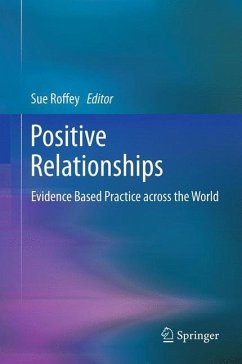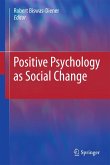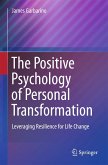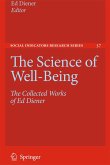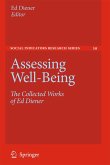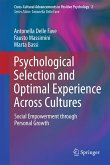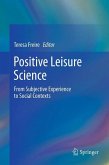Relationships are at the heart of our lives; at home with our families, with our friends, in schools and colleges, with colleagues at the workplace and in our diverse communities. The quality of these relationships determines our individual well-being, how well we learn, develop and function, our sense of connectedness with others and the health so society. This unique volume brings together authorities from across the world to write about how relationships might be enhanced in all these different areas of our lives. It also explores how to address the challenges involved in establishing and maintaining positive relationships. This evidence-based book, primarily grounded in the science of positive psychology, is valuable for academics, especially psychologists and professionals, working in the field of well-being. Relationships are part of everyone's experience and the quality of relationships makes all the difference to self-concept and self-esteem, resilience and well-being, empathy, connection with others, authentic happiness and the ability to function and flourish. Positive relationships enhance well-being at all levels, individual, family, community and society. The breakdown of positive relationships is the foundation for many ills that Western societies now face.
We live in an age of amazing technological advance but have paid less attention to understanding ourselves and each other. Deconstructing the dynamics of positive human interactions has been limited until comparatively recently although research studies on resilience, parenting and effective learning encironments have all emphasised how crucial this is. We know more about outcomes for individuals and organisations when relationships are distant, negative or hostile but are only just beginning to identify the multiple, complex and interactive factors that help to make relationships positive. Howard Gardner in his seminal work on multiple intelligence in 1983 was one of the first to raise the notion on intra and interpersonal intelligence. These concepts were taken up by others, notably Daniel Goleman, and there is now an increasing focus on emotional and social intelligence for success in all areas of life. Positive psychology has built on this foundation, gathering evidence about what contributes to authentic well-being and a meaningful, fulfilling life.
This unique volume brings together authorities from across the world to write about how relationships might be enhanced in all these difference areas of our lives. It also explores how to address the challenges involved in establishing and maintaining positive relationships.
This evidence-based book, primarily grounded in the science of positive psychology, is valuable for academics, especially psychologists and professionals, working in the field of well-being. Relationships are threaded through every aspect of our lives, at home, at school, at work and at play. They are the foundation of our greatest happiness but can also be the cause of our deepest despair. Despite how crucial they are, we may not give much thought to relationships except when they go wrong - whether this is lost intimacy, violence in our communities or toxic working environments.
This highly accessible book takes a positive psychology approach to explore why healthy relationships are important for resilience, mental health and peaceful communities, how people learn relationships and what helps in developing the positive.
There is something here for everyone in both their personal and professional lives - and for students who anticipate working with people in any capacity. Chapters provide a wealth of evidence on promoting optimal interactions between couples, friends, parents and children and community groups. Authors address positive environments at work and at school, mentoring relationships, a new paradigm for relational leadership and how to foster tolerance between people of different faiths. Others explore what is best for children after family breakdown, how to ensure that conflict is more about learning than losing and what might help repair relationships that are damaged. Authors are academics and practitioners from across the world providing both evidence-based practice and practice-based evidence. Examples and case-studies throughout each chapter illustrate what works.
Overarching themes include seeking what we have in common rather than what divides us, fostering positive communication practices, building social capital and what it means to treat each other with respect. The science of positive psychology shows that relationships can offer real meaning and sustainable fulfilment in our lives. Knowing what promotes the positive is the first step to authentic wellbeing.
We live in an age of amazing technological advance but have paid less attention to understanding ourselves and each other. Deconstructing the dynamics of positive human interactions has been limited until comparatively recently although research studies on resilience, parenting and effective learning encironments have all emphasised how crucial this is. We know more about outcomes for individuals and organisations when relationships are distant, negative or hostile but are only just beginning to identify the multiple, complex and interactive factors that help to make relationships positive. Howard Gardner in his seminal work on multiple intelligence in 1983 was one of the first to raise the notion on intra and interpersonal intelligence. These concepts were taken up by others, notably Daniel Goleman, and there is now an increasing focus on emotional and social intelligence for success in all areas of life. Positive psychology has built on this foundation, gathering evidence about what contributes to authentic well-being and a meaningful, fulfilling life.
This unique volume brings together authorities from across the world to write about how relationships might be enhanced in all these difference areas of our lives. It also explores how to address the challenges involved in establishing and maintaining positive relationships.
This evidence-based book, primarily grounded in the science of positive psychology, is valuable for academics, especially psychologists and professionals, working in the field of well-being. Relationships are threaded through every aspect of our lives, at home, at school, at work and at play. They are the foundation of our greatest happiness but can also be the cause of our deepest despair. Despite how crucial they are, we may not give much thought to relationships except when they go wrong - whether this is lost intimacy, violence in our communities or toxic working environments.
This highly accessible book takes a positive psychology approach to explore why healthy relationships are important for resilience, mental health and peaceful communities, how people learn relationships and what helps in developing the positive.
There is something here for everyone in both their personal and professional lives - and for students who anticipate working with people in any capacity. Chapters provide a wealth of evidence on promoting optimal interactions between couples, friends, parents and children and community groups. Authors address positive environments at work and at school, mentoring relationships, a new paradigm for relational leadership and how to foster tolerance between people of different faiths. Others explore what is best for children after family breakdown, how to ensure that conflict is more about learning than losing and what might help repair relationships that are damaged. Authors are academics and practitioners from across the world providing both evidence-based practice and practice-based evidence. Examples and case-studies throughout each chapter illustrate what works.
Overarching themes include seeking what we have in common rather than what divides us, fostering positive communication practices, building social capital and what it means to treat each other with respect. The science of positive psychology shows that relationships can offer real meaning and sustainable fulfilment in our lives. Knowing what promotes the positive is the first step to authentic wellbeing.

